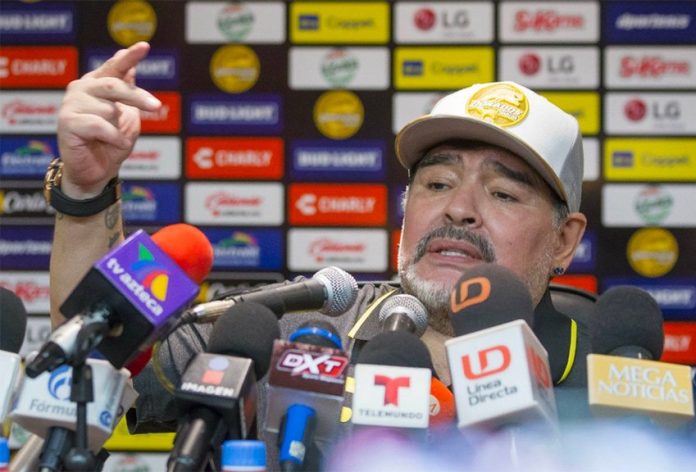At Mexico City’s iconic Estadio Azteca in 1986, Argentine soccer legend Diego Maradona scored the most controversial and infamous goal in World Cup history: the self-proclaimed “hand of God” in a 2-1 quarter-final victory over England.
Now, 32 years later, the 57-year-old, who went on to lead Argentina to World Cup glory at the same cavernous arena, is back in Mexico as coach of Dorados, a second-division professional team in Culiacán, Sinaloa, a city better known for its links to the narco underworld than the sporting sphere and where, in any case, baseball is more popular than soccer.
While hundreds turned out to welcome the storied soccer champion-turned-coach at the Culiacán International Airport on September 8, not everyone in the northern city, which notorious drug lord Joaquín “El Chapo” Guzmán once called home, is happy to see him.
According to media reports, residents of an exclusive gated community where Maradona is expected to take up residence are less than impressed about his impending arrival, concerned not only about the attention his presence will inevitably bring to the area but also his history with illicit substances — this in a city that has been plagued by drug-related violence.
“The people here say, ‘We don’t want Maradona,’” said Cristian Barceló, a reporter for Radio Sinaloa. “It’s the drugs!”
Maradona, often considered the second greatest footballer of all time behind only Brazilian legend Pelé, is almost as well-known for his long-lasting cocaine addiction as his brilliant feats on the soccer pitch.
However, at his first news conference in Culiacán — attended by more than 100 members of the Mexican and foreign press — Maradona said that taking drugs “was a step backward, and what soccer players have to do is go forward.”
The new coach, decked out in a Dorados kit featuring the number 10 he made legendary, conceded he had made “a lot of mistakes” in life but added: “I assume this responsibility [as coach] like someone who holds a child in their arms.”
Responsible for bringing Maradona to Culiacán is Jorge Hank Rhon, a gambling tycoon who owns the Dorados as well as the Xoloitzcuintles, the professional soccer team in Tijuana, where Hank also served as mayor between 2004 and 2007.
The businessman has long faced rumors of ties to organized crime although they have never been proven.
In addition, Hank was arrested on weapons charges in 2011, which were later dropped, and he has also been accused of laundering money and smuggling elephant tusks. He has denied any connection to organized crime.
Hank hasn’t revealed details of Maradona’s contract with the struggling Dorados, who didn’t record a win in its first six matches of this season, but local media have estimated its value at US $150,000 a month.
For that kind of wage, the owner and the team’s fans, who turned out in the hundreds at the Dorados’ first training session under Maradona’s leadership, no doubt expect results where they count most: on the field.
On Monday, Dorados played its first match with its new coach at the helm against the Cafetaleros de Tapachula, a team languishing in last place on the second-division ladder.
After a disappointing first half, Dorados exploded in the second with a hat trick from Ecuadorian striker Vinicio Angulo, who wore the number 10 shirt made famous by Maradona.
The team won the match 4-1, getting its first victory of the season, and with that, Maradona had passed his first real test in his new role and perhaps took the first small step towards winning over some of his detractors.
“He’s an eccentric, and with all his excesses he’s not the best example we could have,” elementary school teacher Efrain Angulo told The Washington Post at the end of the match.
“But as a sportsman, he’s respected. He’s one of the best there has ever been. And if he gets wins here, all the better.”
One of Maradona’s new charges at Dorados, Colombian forward Juan Galindrez, told the newspaper El Universal after Monday’s match that the team’s new manager, who also coached Argentina for two years from 2008 to 2010, has taken to his new role with zeal.
“Yes, he is very happy, he’s very happy with this challenge. He smiles on the field . . . if there’s a goal he celebrates it like it were his own,” he said.
“Diego is in his element . . . Every day, I’m very excited to work with him . . . there’s no pressure. . . In this short time I’ve known him, he’s been dedicated to us. He listens to our concerns and gives us his support.”
Maradona’s famous “hand of god” goal, in which the ball touched his hand before entering the goal, was an infraction the referee did not see. Maradona said after the game that the goal was scored “a little with the head of Maradona and a little with the hand of God.”
But it wasn’t his only goal of the match. Four minutes later he scored what came to be known as “the goal of the century” and is sometimes called the greatest goal of all time, a 60-yard dash in which he got past four English players before executing a feint and scoring.
Source: Milenio (sp), El Universal (sp), The Washington Post (en)
